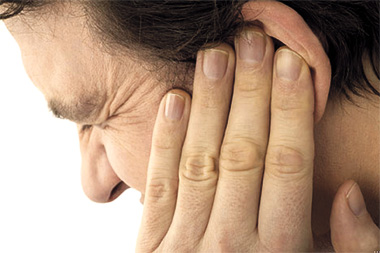Tinnitus is the perception of sound in the ear without an outside source. It can happen to young and old with a variety of complicated causes involved. The chirping of a cicada is a beautiful sound of summer. But to always have a cicada chirping in your ear is no fun at all. Tinnitus, or ringing in the ears, can sound like cicadas chirping or thunder rumbling. It can be so loud that it makes it difficult to understand speech, distinguish voices or go to sleep. TCM suggests that keeping a good mental attitude, getting enough sleep and taking herbal treatments can help relieve the symptoms.
Tinnitus is the perception of sound in the ear without an outside source. It can happen to young and old with a variety of complicated causes involved. Though it may not necessarily lead to deafness, it indicates an underlying condition that needs adjustment. Occasional tinnitus is not a major problem and may be caused by fatigue or lack of sleep, but if it continues for more than a week, it is best to see a doctor, says Dr Zheng Ronghua, chief physician of Ear-Nose-Throat Department of Longhua Hospital attached to Shanghai University of TCM.
TCM doctors usually suggest Western treatments for tinnitus in the early stages. If there is no improvement after one or two months, TCM treatments will try different methods including herbs and acupuncture.
TCM believes that all the energy channels are linked to the ear, and thus connect the ear to all other organs. Therefore, tinnitus may suggest a disorder in another organ.
|

|
|
TCM suggests that keeping a good mental attitude, getting enough sleep and taking herbal treatments can help relieve the symptoms of tinnitus. [Shanghai Daily] |
Low energy and blood stagnation are the most widely seen causes of tinnitus among patients, says Dr Zheng. Kidney deficiency due to aging is often seen among the elderly. Excessive pathogenic heat in the liver and viral infections can also cause tinnitus.
Bad life styles, shortage of sleep, a weakened constitution from disease, or long-term bad temper can all lead to energy and blood stagnation inside. Low energy and blood circulation may affect the microcirculation in the ears as well and sometimes result in tinnitus. Invigorating blood circulation is the main strategy in relieving tinnitus in this case. Herbs like chuan xiong (ligusticum chuanxiong hort), dan shen (red sage root), dang gui (angelica), huang qi (milk veteh) and kudzu root are often prescribed to help.
Tinnitus caused by deficient kidney energy usually happens to people over 40 years old when organ function begins to decline. The sounds heard are usually light, and the patients often suffer sore backs or a lessening eye-sight at the same time.
Deficient kidney energy leading to declining hearing may show as tinnitus in the early stages and gradually lead to deafness if the deficiency continues.
A good mood
Patients will need herbal reinforcements to boost the kidney energy and activate blood circulation. Herbs like shu di huang (prepared rhizome of adhesive rehmannia), yam, bilberry, calamus and Chinese thorowax are often used.
Excessive pathogenic heat in the liver can also lead to tinnitus. Tinnitus in this case usually attacks unexpectedly and loudly, and is aggravated when the patient is angry or depressed. The patient may also suffer irritation, dizziness, or headaches.
Tinnitus related to neurasthenia is also caused by pathogenic heat in the liver according to Dr Zheng. Maintaining a good mood is important in the treatment for this. Drinking herbal medicines that help clear heat in the liver is also needed. Herbs like felwort, tian ma (rhizoma gastrodiae), chrysanthemum and huang qin (Baikal skullcap root) are widely prescribed in this case. Adding herbs that soothe nerves like wild jujube and tuckahoe can help relieve the vicious circle between sleeplessness and tinnitus.
Viral infections can also cause tinnitus. It often appears as an acute ailment accompanied by cold symptoms like a blocked nose, a runny nose or coughing. This is called acute secretory otitis media in Western medicine, while TCM describes it as a result of invading pathogenic "wind." Herbs that help clear internal pathogenic wind are recommended. These include honeysuckle, forsythia, fang feng (radix saposhnikoviae) and calamus.
Acupressure on certain acupuncture points like yi feng, wan gu and zhong zhu also helps relieve tinnitus.
Using mobile phones less and avoiding earphones are also important in preventing aggravation, says Dr Zheng. Listen here for practical help Shan zhu yu congee
Ingredients: Shan zhu yu (common macrocarpium fruit, 15g), rice (60g)
Preparation: 1. Wash the shan zhu yu and get rid of the cores.
2. Make congee with the ingredients and sweeten it with sugar when it is done.
3. Eat it a bowl of congee once in the morning and once at night. Keep it for three to five days.
Benefits: Helps reinforce the kidneys and thus relieves related dizziness, tinnitus and sore backs.
Acupressure on the ears
1. Rub the auricles (the main projecting parts of the ears) for five minutes.
2. Press and rub yi feng, wan gu and zhong zhu points for one minute.
3. Put your middle fingers into your ears and shake them about 10 times and then take your fingers out. Repeat this five times.
4. Press on the tragus (the little piece of flesh at the front of the ear hole) 10 times.
5. Gently stretch the auricles 10 times.
6. Complete the acupressure once in the morning and once at night.
Yi feng
Location: On the ear, in the depression between the mastoid process and the mandible, behind the earlobe.
Wan gu
Location: In the depression posterior and inferior to the mastoid process. Zhong zhuLocation: With fist clenched on dorsum of the hand between the fourth and fifth metacarpal bones in a depression proximal to the fourth Metacarpalphalangeal joint.
(Shanghai Daily July 15, 2009)